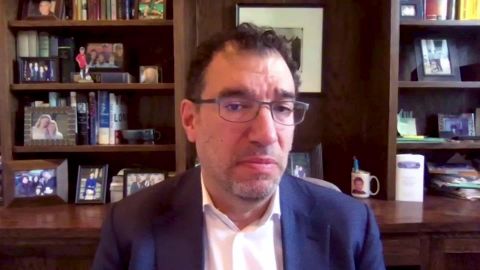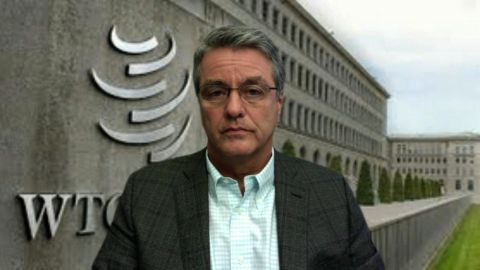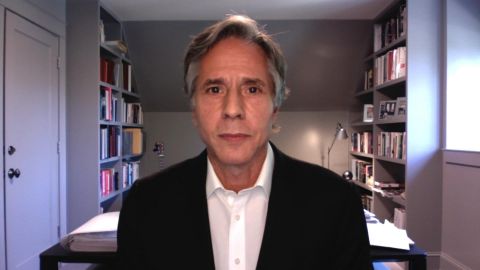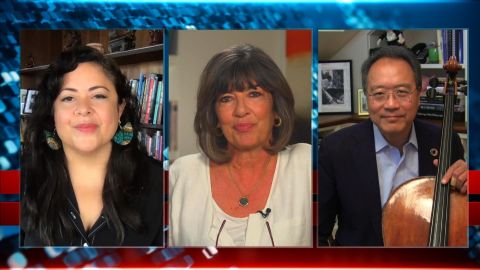Read Transcript EXPAND
CHRISTIANE AMANPOUR: The global pandemic has put a spotlight on the critical role of public health, something our next guest knows all too well. For two years, Andy Slavitt served under President Obama as Acting Administrator for the Centers for Medicare and Medicaid Services, and recently he helped Senator Bernie Sanders draft the Masks for All Bill which calls on the U.S. government to deliver free masks to all citizens. Here he is telling our Hari Sreenivasan that trust is the missing link needed to tackle this pandemic.
HARI SREENIVASAN: Christiane, thanks so much. And Andy, thanks for joining us. Let’s start with a little bit of optimism if we can, in this era. You wrote something recently saying it’s not too late, we can still get on top of this – how?
SLAVITT: We should have reason to be optimistic. This virus is not – it’s so mysterious at least when it’s outside the body that the world hasn’t figured out how to move on with it and move on with their economy and not lose a lot of lives. Just so, the fact that we haven’t done it here in the U.S. yet doesn’t mean we can’t. And the truth is, most of the gifts that we need – most of the tools that we need in order to do this, we were born with. The only way we pass the virus along is to breathe near one another. So if we stop breathing near one another either by wearing masks, or staying home for several weeks given the incubation period the virus dies because it has no place to go. That would mean a period of time where we’d have – there would be some extended sacrifice, but it’d be a matter of weeks. But at the end of that you can imagine we could walk our kids to school, we could vote in person, we could travel again, our economy could open up – we could hire. So I do think as soon as we choose to, we have an opportunity to move back to closer to normal.
SREENIVASAN: So Andy, you’ve got this kitchen sick approach, highlight some of the big points for us.
SLAVITT: I think the first thing to do is sell the public on why four to five weeks of sacrifice because that’s what we’re talking about is in everybody’s best interest and I think I have that dialogue in an honest way that we really haven’t had in this country. And to understand what that would allow us to do on the other end of it. We would be out of this, what I consider to be 70 percent existence and in to something where we don’t have 1,000 people a day dying, we may be at five or six people a day dying. And we have an economy that, with a couple of exceptions is really robust again. So we have to have that dialogue and if people believe that that’s the right course, and I think that if that’s on the table many people might. Then I think there’s a few simple things and we know what they all are. It’s universal mask wearing, it’s making sure that people have safe space to isolate so that people isolate at home and they can isolate in hotels if they can’t isolate safely at home. And the one difference from what happened in April is that in April we did what we thought was a shutdown, but in almost every state it was really what I call a 50 percent shutdown, not what I would describe here as the 80 and 90 percent shutdown. Meaning we defined about half of the people in the country as essential workers. The lower income people, people who are driving trucks, people who are bringing food to the market, people who are delivering stuff to our door. And we would do a lot less of that if we really wanted to clamp down on this virus.
SREENIVASAN: I mean, how do we even get to that place from where we are? I mean, I am talking to you from Florida. The positivity rates are up above 10 percent. I mean, you have roughly close to 10,000 people a day testing positive here. At that point I don’t think that Florida or any state has the ability to contact trace all 10,000 people that are testing positive every day.
SLAVITT: Well, New York did it and New York is where you were in Florida not that long ago. And so the question is how you manage the backside of the peak. Florida, and Texas, and Arizona, Southern California – the southern states are soon to be peaking if not having peaked already, that’s great news. The question there though is will they have a flat – excuse me, will they have a flattening out where they just don’t go down very much and a very long decline or will it be like New York, New Jersey and Connecticut where their drop was almost as fast as their rise. And when that happens you have a situation where you have more than enough contact tracing, and testing, and so forth. So it does require active management and active leadership which is why this is hard because you’re asking people to sacrifice and you need leadership both at the federal and the state level to do this. But it doesn’t mean we shouldn’t consider it.
SREENIVASAN: Well look, we in this particular state that I won’t be in for that much longer, but there isn’t (ph) kind of state leadership. I mean, if it wasn’t for a local city ordinance that said when you walk in to a business and even now I can walk in to a business and see people that are not wearing masks, that don’t believe the science about it, they think it’s a hoax, they get in to altercations with the grocery store clerk about it. I mean, it’s just – there was a viral video the other day of a couple in, I want to say it was Minnesota were wearing swastika masks on their faces and saying that this is the Nazi future that we’re heading to if you vote for Joe Biden. I mean, everything has kind of – the lack of belief in science, the politicization – all of it exists. So even if you could message clearly, how do you get through to these pockets of people?
SLAVITT: And the number one pushback I get from this, with being labeled a kitchen sink proposal is we’re going to have to wait until Joe Biden’s president or until there’s some other political leadership or some mood shift in the country. And my response to that is I don’t think it’s worth sparing another – waiting to spare another 50,000 lives. If President Trump – he’s our president right now. My expectation of him is that he cares more about human life than he does about his own political future. By the way, I think this would be good for his political future if he did this. But my expectation is beyond politics. We should expect all of our political leaders to put us first. We hire and we pay for them. And yes, I completely agree with you. We have a cultural – we have a set of cultural challenges in this country that are beyond politics. I don’t just put it on the politicians. Our virtues – our founding virtues and our distrust of government – independence, liberty, freedom – we have a consumer economy. We have a want it now kind of – all of those things which in other times our virtues are real challenges to us now.
SREENIVASAN: How do you get to a point where everything seems to be looked at through a political lens? Whether it’s mask wearing, whether it’s what expert you listen to, what channel you watch? I mean, I kind of come back to this importance of whether you’re getting good information to base your decisions on? And people have sort of taken that for granted that information should be fair, that all of it is equal, that every opinion is the same and then we have situations like a couple of days ago where you’ve got people in white lab coats pushing something that’s scientifically not valid and it gets amplified at the highest levels of government.
SLAVITT: Well look, I think it’s taken us a couple of decades to erode what I think is a core missing ingredient in being able to take on this coronavirus. And it’s not cotton swabs, it’s not reagents. It’s actually trust – it’s actually the ability to have trust in information and institutions that can help lead us. Now, it’s no secret that Trump won out of being an anti-institutionalist. And he has succeed in diminishing the Centers for Disease Control and the Food and Drug Administration. But understand that it’s a complicated decision to understand how a drug trial works and whether a drug is effective. And that is why every American isn’t asked to decide for themselves. That’s why we don’t look at our favorite politician and say, which drug should I take? We created a nonpolitical institution called the FDA, their job is to bring in the best scientists and the best research in the world to conduct very well designed studies and to tell us what is safe and effective. They don’t always get it right, but when they don’t always get it right the job isn’t to diminish them and to listen to somebody else. I’m not expert in clinical trial studies and what’s an effective or safe drug – but neither is President Trump, neither is his daughter, or his son-in-law, neither is his son, neither is (ph) the people on Twitter, neither is your doctor or any scientist – or the people that are experts, people we have hired to do this and when they get it wrong they fix it. So we have to understand that these institutions we have are meant to take politics away from these decisions. We’ve set these institutions up for that reason. The president and others – I don’t just only blame him, but I put a lot of blame on him, has really eroded faith in these institutions by making them far more political and then by criticizing and undermining them.
SREENIVASAN: So if I’m in a small town somewhere, let’s say it’s generally politically to the right or just doesn’t trust the federal government as much. What’s your advice for local authorities who might actually still have some sway in helping their constituents their population – we’re talking down to like the sheriff level. What should they be doing, what should they be thinking about in the next couple months?
SLAVITT: Well so, two things. First of all I think we should regain a little bit of the empathy motion (ph) that we’ve lost in the country. And by the way we don’t just need to be empathetic to the people who are losing their lives and losing family members to coronavirus. If you’re in a small town and you’ve started a restaurant, and 20 years of your life went in to it and it closed because of coronavirus or you’ve lost a job, you deserve equal empathy. And by the way, coronavirus – that is coronavirus to you. If you live in New York coronavirus may be the sirens (ph) and the people you’ve lost that you know (ph). In a small town in South Dakota it’s very much the economic hardship. And we ought to understand that that not everybody’s coming from a bad place. The media will highlight the Nazis walking in to the store in Minnesota, but truly that doesn’t represent America. What represents America is a lot of fear, a lot of uncertainty, a lot of impatience that comes for situations like this. And so the truth is you have to listen to local officials. You have to acknowledge when they say, look, the economic consequences are worse right now – the only thing I would ask in return from a local official is that we have to have – they have to have the tools in place to know when the virus (inaudible). So if they’re – they have adequate testing of asymptomatic people and they have the ability to do contact tracing, and if there’s an outbreak there whether it be in a meat plant or somewhere else that within a day or two they’re going to know and they can make adjustments. If they don’t have those tools, and this is the danger we’re in now with community spread – you just have to kind of assume it’s everywhere. When you’ve got to wait eight days to get a test result you’re completely blind, and so you can’t give the break to the small town that deserves it and let them go on their lives. So the more of these tools we have, it’s like putting brakes on a car. You put brakes on a car and you can drive it faster. Without brakes you’re not going to drive it very fast.
SREENIVASAN: One of the things that this has revealed to us is all the different gaps in our existing healthcare system, our safety net, social stratification, class distinctions – did we have a healthcare system that was ready for this?
SLAVITT: A good system in a crisis has a resilience to mitigate the damage. A bad system exacerbates the damage. And what we have had is a bad system, and I’ll give you a couple of examples. Thirty million people have lost their jobs, people’s insurance is tied to their employment for many people – 5 million people have lost their insurance in the middle of this crisis – that’s a bad system. That tells us there’s something wrong. Second thing, we all pay premiums – or many of us pay premiums to insurance companies so that we can get the healthcare we need. When people stop going to the doctor, doctors started losing money fast, hospitals started losing money fast – we weren’t getting the healthcare we needed, but do you know who did fine? The insurance companies, made billions, and billions, and billions of extra dollars for doing nothing – that is not what’s supposed to happen. That means we have a broken payment system, that means the middle men or middle women that are standing in the middle are designing and operating the system, so that’s the profit piece. And then the third thing that I pointed out, and maybe the most challenging and the most important is the inequity in the system. It’s how healthcare is available to you based upon your race, based upon your zip code, based upon your income, based upon a lot of factors that have nothing to do with your health and so we have this widely disparate set of outcomes. And so if we’re going to take some of the lessons from the pandemic into making our country better, which I hope we do. Don’t know if we will, but I hope we do. We will focus on those three issues, and if it’s .
SREENIVASAN: From being the fix-it guy from when healthcare.gov broke, and recognizing, again, a very small scale crisis compared to the one we’re facing now, what are the lessons learned from that that you can apply to this?
SLAVITT: The first thing is you’ve got to have one thing that matters the most. You’re never going to fix anything if you’re saying well this is important but so is this, and so is this, and so is this – so you have to decide. Is getting rid of the pandemic and coronavirus and crushing the curb (ph) the most important thing? Because if it’s not – and you say yes, but also send your kids to school on time, you’ve got to send them there September 1st. And also, I need to have my steaks delivered so I want to make sure that the meat plants don’t close. Once you do that you’ve basically said you’re not going to – you’re not going to get through the crisis. Secondly, accountability. You need to have – be willing to say it is more important to me and I will fix this, and I will work to fix this. The president, I think misunderstands something about the American public. The American public can take bad moves, if it’s given straight, and it’s given with solutions the American public will respect you for putting it forward and solving the problem, and saying we’re accountable. They may not like you at that moment, but you will – it will help you get through it. The president doesn’t like to deliver bad news so we get a varying set of ideas, excuses, ignoring the problem when he can’t – and there’s only two things that brings him to it one is if the stock market goes down, and the other is if his polls go down. And the public sense that. And so, some of this, quite honestly isn’t very hard. I mean, it has been done all over the world. It’s impossible to do perfectly, but if you bring empathy, accountability, and focus you can do pretty well. You’re never going to look back at this and say it wasn’t a difficult time, but you can get a lot of credit for just doing those things.
SREENIVASAN: Andy Slavitt, thanks so much for joining us.
SLAVITT: Thank you.
About This Episode EXPAND
Biden adviser Antony Blinken responds to President Trump’s tweet suggesting the November election should be delayed. The director-general of the WTO discusses a historic downturn in the U.S. economy. Yo-Yo Ma and Maya Soetoro discuss a new project asking artists what music means to them. Andy Slavitt explains his “kitchen sink” strategy for combating the COVID-19 pandemic.
LEARN MORE



